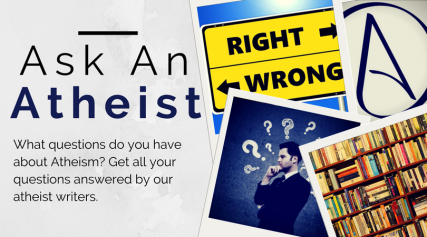What do you want to ask an Atheist? Fill out the form below or submit your question online.
By Jim Downard
What does civility look like?
 It’s been an endangered species in some quarters these days, but that we can still ask the question suggests we know what it looks like. That’s why we’re lamenting its absence.
It’s been an endangered species in some quarters these days, but that we can still ask the question suggests we know what it looks like. That’s why we’re lamenting its absence.
Civility is at heart being honest and kind. Civility is not failing to call out ignorance, or hiding one’s deep convictions, but how those are presented in public.
Civility is not about prejudicial insult. It is not about demonizing people, even (or especially) those who hold objectively wrong positions. It means being polite but firm and clear in upholding the good and the right and the true, and letting the factual chips fall where they may.
Terms that get bandied about too easily when civility is frayed, a couple come to mind … “liar” (when what is meant is that an untrue statement is made, forgetting that people can believe and repeat such things even as they believe them to be true) … “fascist” (my, how that one gets bandied about, and gets applied to people on both ends of the political spectrum by people who maybe have forgot what real fascists look like, diluting its impact by the overuse of it).
 Civility involves turning down the rhetorical thermostat, leavening it more with wit and graciousness. Maybe try to get one’s point across by being funny. Worked for Bernard Shaw. Or by being insightful and thought-provoking. Worked for Rod Serling. Or even being tuneful. Worked for Rodgers & Hammerstein.
Civility involves turning down the rhetorical thermostat, leavening it more with wit and graciousness. Maybe try to get one’s point across by being funny. Worked for Bernard Shaw. Or by being insightful and thought-provoking. Worked for Rod Serling. Or even being tuneful. Worked for Rodgers & Hammerstein.
Civility is also best served by honest curiosity, seeking out to discover what is actually true, before shooting off the verbal guns about what one thought to be true. Show more to work that out, and then wonder how you would go about phrasing your thoughts, as if tailored to an especially innocent child who you want not to take anything the wrong way.
And then the practical: life is too short to indulge in incivility, the digestion suffers and so too does the mind.
It would help, of course, if more at the top of the communication chain toned down their tweets, used less CAPS and could figure out how to spell (“covfefe” … really?). But we shouldn’t avoid reinvigorating the process at our end just because a Narcissist-in-Chief doesn’t have an emoji for it.







